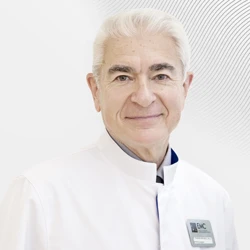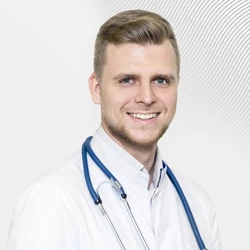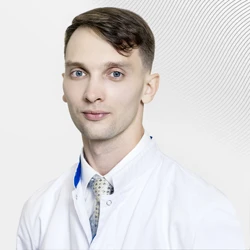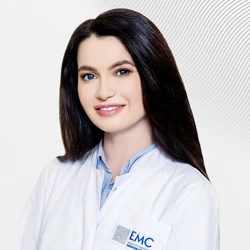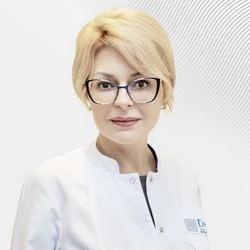Treatment of stomach cancer
Types of glioblastoma
With this method of treatment, the drug is selected based on molecular genetic tests, which allows for the most effective treatment for a particular case. In addition, this method allows you to act exclusively on the affected cells and not damage healthy ones.
In the course of targeted therapy, the use of Bevacizumab or Avastin has a particularly positive effect. The drug is administered through a venous catheter. It strikes the blood vessels that are involved in the formation of glioblastoma. As a result, the malignant cells are destroyed. Bevacizumab is most often used to control relapses.Advantages of targeted therapy in EMC
EMC is the only clinic that provides the most comprehensive genomic profiling service for the selection of targeted therapies. This method is also used in the fight against glioblastoma. EMC specialists compile a molecular genetic portrait of the tumor without obtaining a sample of its tissue: the patient's blood plasma is sufficient.
Causes of the disease
There are several causes of stomach cancer. People with a hereditary predisposition are in a special risk group – if there is stomach cancer in blood relatives, the probability of the disease increases to 20%. The formation of a tumor is provoked by various diseases of this organ: polyps, low-acidity gastritis, Epstein-Barr virus, primary and secondary immunodeficiency conditions, for example, AIDS, malignant anemia. 25% of patients with gastric cancer had a history of ulcers. Interaction with minerals such as asbestos and nickel also provokes the development of oncological tumors. If there is a bacterium Helicobacter Pylori in the stomach, it can also provoke the development of oncological tumors. Excessive alcohol consumption, smoking and poor nutrition also contribute to the development of malignant neoplasms. It is important to monitor the indicators of vitamins C and B12 – their chronic deficiency is dangerous and can lead to the development of cancer years later.
Cancer does not occur overnight: there are always prerequisites for this disease. In case of stomach cancer, it takes from two to five years from the formation of the first cancer cell to the onset of symptoms. As a preventive measure, doctors advise everyone over the age of 42 to have a gastroscopy once every 2-3 years and undergo a medical examination once a year. This will make it possible to identify a malignant neoplasm at the stage when it is treatable and defeat stomach cancer.
Cancer is treated with radiotherapy, chemotherapy, and surgery. Methods of treating stomach cancer can be combined or used independently of each other. Surgery for stomach cancer is not possible in all cases. There is a resectable (when surgical intervention is acceptable) and an unresectable cancer. Specialists distinguish two clinical groups: the first is a locally advanced tumor (stages I-III), the second is a tumor that spreads to surrounding organs and is accompanied by metastatic damage to organs and lymph nodes (stage IV). After establishing an accurate diagnosis and identifying the extent of the tumor process, a council of doctors (surgeon, radio and chemotherapist) decides whether surgery is possible and draws up a treatment strategy. If the patient has a locally advanced tumor (stages I-III), then the chances of defeating stomach cancer are high. The final diagnosis is made after an extended examination, which allows you to determine a treatment plan if the malignant neoplasm has grown and penetrated into the submucosa and /or if there is involvement of lymph nodes in the process of tumor growth. At EMC, we also treat patients with advanced stage IV stomach cancer using the palliative care method. It allows you to increase the patient's life expectancy and improve its quality.
Surgery should not be performed in cases where there are distant metastases and/ or they have penetrated into large vascular structures. Plastic linitis is an unresectable variant of malignant gastric lesion. In such a cancer, a malignant tumor can occupy a large part of its wall or even the entire organ. As a result, the walls of the stomach thicken, and surgery as a treatment method is not suitable in this case.
Advantages of gastric cancer treatment in EMC

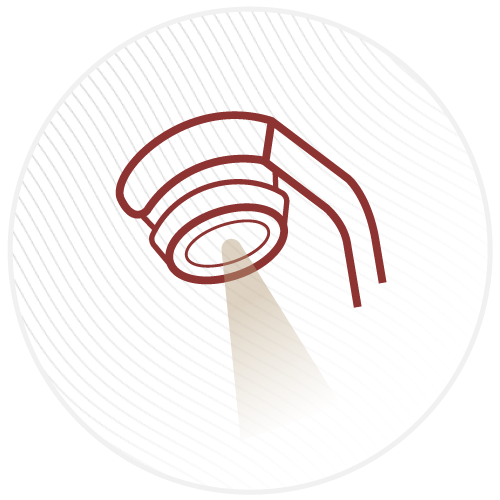


Gastric cancer surgery in Moscow
The volume of the organ being removed depends on where the tumor is located. So, during the operation, either the entire stomach or part of it is removed. If the tumor is small and has not penetrated the mucous layer, mucosectomy is performed right during gastroscopy — removal of a fragment of the stomach wall, including the mucous membrane. Cancer surgeries are performed both by the open method and minimally invasive (these include laparoscopic and robot-assisted surgeries). The latter technique eliminates the need to make large incisions, and the surgeon can perform the operation by making small punctures with thin instruments and using a laparoscope. A small camera is attached to the instrument, which transmits the image to the monitor. Since large incisions injure the muscle tissue, the wound heals for a long time after surgery. With minimally invasive surgical methods of treatment, this is excluded: the intensity of pain after such types of interventions is significantly lower than with open surgeries, patients recover faster and return to their usual lives.
As a rule, surgeons perform the operation on the day of the patient's admission to the clinic. The operating rooms at the EMC are equipped with the most high-tech and innovative equipment (for example, the Da Vinci SI HD robot), which allows the operation to be performed in the most comfortable and safe manner without subsequent complications and side effects.
Radiation therapy
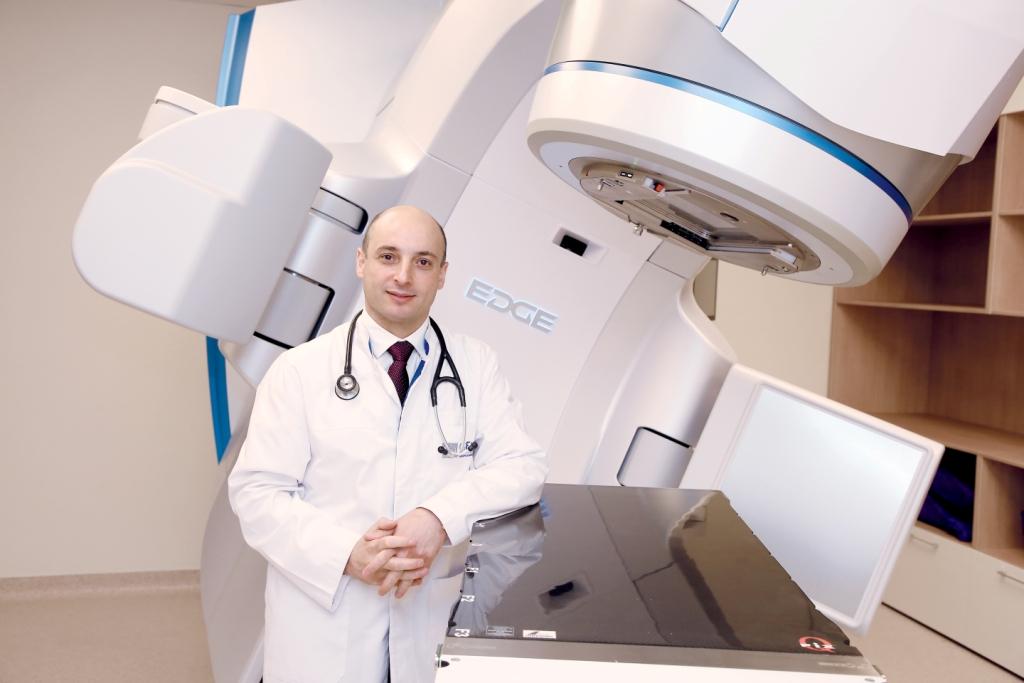
Radiation therapy (radiotherapy) is most often combined with chemotherapy, which increases the effectiveness of cancer treatment. Radiation slows down the growth of malignant cells, and chemoradiotherapy after surgery significantly increases the rates of disease-free period and overall survival. In the last stages of the disease radiation therapybecomes part of palliative care and facilitates the impact of disease symptoms on human life.
In some cases, EMC specialists use a combination of chemotherapy and radiation therapy to more effectively affect the tumor.
Chemotherapy
What should I do if the patient cannot have surgery? In this case, he is prescribed a course of chemotherapy to treat a stomach tumor. Patients undergo chemotherapy in courses – their number, regularity and medications are selected individually by the attending physician, assessing the condition and the specific case. The treatment plan with chemotherapy may vary depending on the body's response to a particular drug. The treatment of metastases of stomach cancer is also often carried out with the help of chemotherapy. They often form in neighboring organs such as the liver, lung, and abdominal cavity, and can also occur in the brain or ovaries.
The EMC uses certified foreign drugs for chemotherapy sessions.
Targeted therapy
Oncological tumors often occur due to genetic defects in cells. In the treatment of stomach cancer, targeted (i.e., targeted) therapy allows you to choose a drug that will affect a specific "pathological" gene, but at the same time, unlike chemotherapy, it will not damage healthy cells and tissues. This will minimize side effects during treatment, improve the patient's quality of life and prolong its duration. In targeted therapy, drugs are most often taken in the form of tablets, which is very convenient for home treatment.
The capabilities of the EMC laboratory allow for the most complete genomic sequencing. Based on the test results, you can make a more accurate individual prognosis regarding a cancer treatment plan and choose the right drug to combat the disease.
Immunotherapy
When a person is confronted with a malignant tumor, his immune system stops recognizing cancer cells, and therefore destroying them. Immunotherapy drugs restore this function.
Certified immunotherapy drugs are available at EMC. It is often combined with chemoradiotherapy, depending on the stage and type of cancer.
Symptoms
At the very beginning, the oncological process develops asymptomatically in the stomach — this is the reason for its aggressiveness, since the patient often does not notice the disease and does not seek help at the initial stages of the development of a malignant neoplasm. In advanced stages of stomach cancer, the following symptoms are characteristic: loss of appetite, frequent nausea, vomiting immediately after eating, rapid saturation with food, weight loss, severe and persistent pain in the upper abdomen, dysphagia (difficulty passing food through the esophagus and swallowing). Very often, a patient with stomach cancer develops latent gastrointestinal bleeding, which is accompanied by iron deficiency anemia. With a prolonged course of stomach cancer, the tumor can be felt – as a rule, it forms in the hypochondrium.
Diagnosis of stomach cancer
One system is used to classify all cancers: the stage is determined, the depth of tumor germination (T), the number of affected lymph nodes (N) and the presence of metastases (M) are taken into account. Depending on these features, a treatment system is selected.
At the first stage, a small tumor appears in the gastric mucosa, it still does not metastasize to other organs and does not affect the lymph nodes. Early diagnosis of the disease significantly improves the prognosis of treatment. In the second stage of gastric cancer, a malignant neoplasm either localizes within the organ and affects adjacent lymph nodes, or does not touch them and spreads beyond the organ. The third stage of cancer is characterized by the penetration of a malignant tumor beyond the stomach wall and damage to several lymph nodes. In the fourth stage, distant metastases occur.
The prognosis of treatment for stomach cancer depends on where the tumor has spread. If the lymph nodes are not affected and metastases have not yet formed, with proper treatment, the patient's survival rate is almost 100%. If the tumor is "young", but metastases have already formed, the quality and life expectancy of such cancer are significantly reduced.
The most effective method of diagnosing lesions of the stomach, esophagus and duodenum is endoscopic examination (esophagogastroduodenoscopy). It allows you to identify a malignant tumor in the early stages. An additional stage of diagnosis is computed tomography (CT). Based on the data obtained, a treatment plan is drawn up.
Esophagogastroduodenoscopy
During the procedure, a special device is inserted into the oral cavity and allows you to take a biopsy when visualizing pathological areas of the mucous membrane. During the examination, the endoscopist will also check for the presence of the bacterium Helicobacter pylori. At the EMC, during the study, we offer patients short-term anesthesia (10-15 minutes), which allows for diagnosis in the most comfortable and painless way. The results of the histological examination of the biopsy are prepared within 3-5 days.
The EMC also performs diagnostics of aggressive forms of diffuse cancer ("plastic linitis"). Endoscopic examination may not always reveal it, as these tumors often grow into the submucosal and muscular layers. In this case, it is necessary to combine the techniques of loop biopsy and pinching examination for diagnosis.
CT
In case of stomach cancer, the doctor can also assess the presence of metastases and the spread of the tumor to other organs using computed tomography (CT). Also, in the late stages of cancer, it is important to have a CT scan every 3-6 months: this allows you to notice a recurrence early and start treatment immediately.
The cost of gastric cancer treatment in Moscow at the EMC clinic is calculated individually after consulting an oncologist.
Why the EMC
The first and only clinic in Russia, created in the image of the world's leading clinics
EMC is a multidisciplinary center offering patients a high level of medical services and a personalized approach
Worldwide recognition and awards
 Learn more
Learn more
Worldwide recognition and awards
 Certificates and licenses
Certificates and licenses
Make an appointment for a consultation
Specify your contacts and we will contact you to clarify the details
Reviews
and new products of the EMC
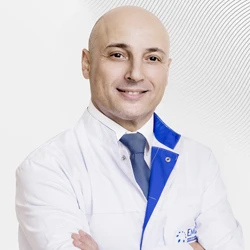
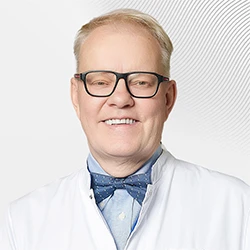
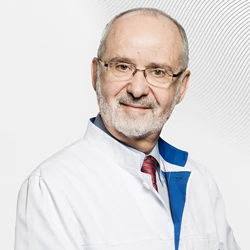
.webp)

